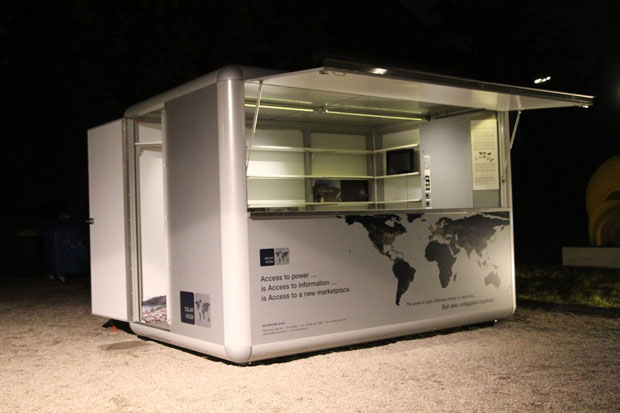Shop for solar power for poor areas
Without electricity, the lives of poor rural people are extremely hard. No television, no lights, no food storage (because there is no refrigerator), you want to use a mobile phone to run 20-30km to a place where there is electricity to charge. The difficult situation in many countries in Africa and Asia . is being solved by German scientists with Solarkiosk products.
Caspar Wiik, an official at Germany's Reiner Lemoine Institut Institute for Solar Energy, said that a year and a half ago, the academy scientists had a long-term study in rural Ethiopia and found people's lives are extremely miserable because of lack of electricity.

Every day, they have to travel up to 20-30km to buy food because the places where they live do not have shops selling food and medicines because they cannot be preserved. Children can not study at night because there is no electricity . From there, scientists have the idea of designing a solar energy shop (Solarkiosk) , integrating many utilities for rural people. . After a year and a half of research and design, Solarkiosk was born with the first 7 units.
Foreign Reporters visited the first model of this store at Solarkiosk GmbH (Berlin, Germany), before it was exported to Ethiopia. It is a store of about 10m 2 , designed reasonably with solar panel system on the roof. Inside is a shelving system, a refrigerator and a battery system that recharges panels with electricity that can be used for lighting, running a refrigerator and operating other necessary electrical equipment.
According to Mr. Caspar, the energy obtained from panels does not directly match electrical devices but is stored in an electric battery system. The battery system of Solarkiosk has a life span of about 10 years, can store enough electricity to run for 2-3 days (for countries with heavy rainy days, Solarkiosk GmbH can design batteries to store electricity for about 7 days ).
The downside of the Solarkiosk is that the price is still high, about 20,000 euros / store (equivalent to 520 million dong), which is not suitable for the income of rural people. Caspar Wiik said that in the future, if mass production, the price of Solarkiosk could be as little as half the current.
- A great solution of $ 6 helps to bring electricity to millions of poor people
- Japan: Take advantage of the old airport to install solar panels
- Toshiba will enter the solar market
- This is the best way to deploy solar power if there is not much land available
- Top 10 countries to exploit solar power in the world
- Solar power and application paradox
- The era of solar power
- New trend: Solar power floats on water
- Use solar power with high technology
- The world's largest solar power plant
- New solar cell batteries can generate electricity on both sides of the module
- Light up with solar power technology
 Norway built the world's tallest wooden tower
Norway built the world's tallest wooden tower Kremlin
Kremlin Ashurbanipal: The oldest royal library in the world
Ashurbanipal: The oldest royal library in the world Decoding the thousand-year construction of Qin Shihuang shocked the world
Decoding the thousand-year construction of Qin Shihuang shocked the world